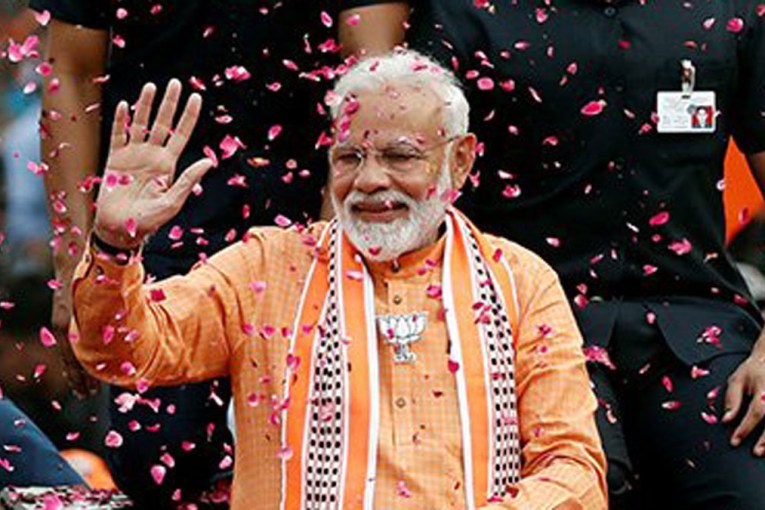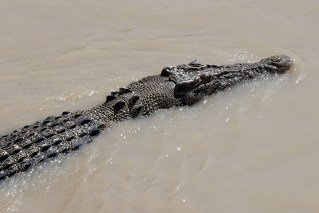Russia has promised to drastically scale down its military operations around the Ukrainian capital Kyiv and the northern city Chernihiv, while Ukraine proposed neutral status with international guarantees to protect it from attack.
It was the first sign of peace talks between the countries are progressing and the first time Ukraine has publicly detailed what it is willing to give up to end the war.
The latest round of face-to-face negotiations failed to put a stop to attacks on civilians, however, with yet another air strike on a port city confirmed on Wednesday morning.
American secretary of state Antony Blinken cast doubt on Russia’s pledges and the British government also urged caution.
“There is what Russia says and there’s what Russia does,” Mr Blinken said.
“And what Russia is doing is the continued brutalisation of Ukraine and its people and that continues as we speak.”
US President Joe Biden said he won’t “read anything” into promises “until I see what their actions are”.
“We’ll see if they [Russia] follow through what they’re suggesting. There are negotiations that continued today, one in Turkey and others,” Mr Biden said.
“I had a meeting with the heads of state of four allies in NATO – France, Germany, the United States and Great Britain – and there seems to be a consensus that let’s just see what they have to offer.”
Meanwhile, European countries have taken further action against Moscow by expelling possible Russian spies.
Here’s what you need to know on Wednesday morning.
Rocket hits city council building
Nine people have so far been confirmed dead following a Russian rocket attack on council building in the southern Ukrainian port city of Mykolaiv.
Dozens of people have been wounded and rescuers are continuing to search for bodies in the rubble.
Footage from the state rescue service showed a gaping hole in the side of the building, with firefighters extinguishing a fire where the rocket hit and the wounded being put onto ambulance stretchers.
There was a blood patch visible in the debris, and shattered glass and upturned furniture strewn on the floor in the offices inside the building.
“This is just a nightmare. A girl died on my floor. What can I say? Are you kidding? I hugged her, two minutes passed, and she passed,” a woman told AAP after she was pulled from the building by rescuers.
“They destroyed half of the building, got into my office,” regional governor Vitaliy Kim said.
Tweet from @DefenceU
Russian forces have attacked Ukraine’s southern ports including Kherson, Odesa, Mykolaiv and Mariupol as they try to cut Ukraine off from the Black Sea and establish a land corridor from Russia to Crimea, the peninsula Russia seized in 2014.
Mr Kim said there was an upside to the strike – it suggested Russia had given up trying to take over the city.
Russia calls its actions in Ukraine a “special military operation” to disarm its neighbour. It denies targeting civilians and did not comment on the strike on Mykolaiv.
Ukraine offers to remain neutral
Ukrainian negotiators said they had proposed a status under which their country would not join alliances or host bases of foreign troops, but would have its security guaranteed in terms similar to “Article 5”, the collective defence clause of the North Atlantic Treaty Organisation.
They identified Israel and NATO members Canada, Poland and Turkey as countries that could help provide such guarantees.
The proposals would include a 15-year consultation period on the status of Russian-annexed Crimea, and could come into force only in the event of a complete ceasefire, the Ukrainian negotiators told reporters in Istanbul.
Russian Deputy Defence Minister Alexander Fomin said Russia had decided to scale down fighting near Kyiv and Chernihiv to create the conditions for dialogue.

Ukraine President Volodymyr Zelenskiy is scheduled to address Australia’s Parliament on Thursday. Photo: AAP
Top Russian negotiator Vladimir Medinsky said he would examine the Ukrainian proposals and report on them to President Vladimir Putin.
The talks held in Istanbul on Tuesday were the first face-to-face meeting between the sides since March 10.
Ukraine’s proposals were the most detailed and concrete that Kyiv has aired publicly.
“If we manage to consolidate these key provisions, and for us this is the most fundamental, then Ukraine will be in a position to actually fix its current status as a non-bloc and non-nuclear state in the form of permanent neutrality,” said Ukrainian negotiator Oleksander Chaly.
“We will not host foreign military bases on our territory, as well as deploy military contingents on our territory, and we will not enter into military-political alliances,” he said.
Military exercises would take place with the consent of the guarantor countries.
The Ukrainian negotiators said there was enough material in their proposals to warrant a meeting between Ukrainian President Volodymyr Zelenskiy and Russian President Vladimir Putin.
Allies target spies
In what appeared to be a coordinated action to tackle Russian espionage, at least four European allies have expelled a total of dozens of Russian diplomats.
The expulsions on Tuesday came against a backdrop of relations between Russia and the West that have been plunged into a deep freeze following Moscow’s invasion of Ukraine.
The Netherlands said it was expelling 17 Russians who it described as intelligence officers masquerading as diplomats. Belgium said it was ejecting 21 Russians. The Czech Republic gave one Russian diplomat 72 hours to leave the country.
Ireland told four senior Russian officials to leave the country because of activities deemed not “in accordance with international standards of diplomatic behaviour.”
“Together with our allies, we are reducing the Russian intelligence presence in the EU,” the Czech Foreign Ministry said.
Poland last week expelled 45 Russians whom the government identified as intelligence officers using their diplomatic status as cover to operate in the country.
The Netherlands said it took its decision in consultation with “a number of like-minded countries,” citing similar expulsions by the United States, Poland, Bulgaria, Slovakia, Estonia, Latvia, Lithuania and Montenegro.
“The cabinet has decided to do this because of the threat to national security posed by this group,” the Dutch ministry said in a statement.
“The intelligence threat against the Netherlands remains high. The current attitude of Russia in a broader sense makes the presence of these intelligence officers undesirable. The deportation is a measure taken in the context of national security.”
Dutch Foreign Minister Wopke Hoekstra said he was prepared for a retaliation from Moscow.
“Experience shows that Russia does not leave these kinds of measures unanswered,” he said.
“We cannot speculate about that, but the Ministry of Foreign Affairs is prepared for various scenarios that may arise in the near future.”
That was demonstrated earlier Tuesday, when Russia said it expelled a total of 10 diplomats from the three Baltic EU states of Estonia, Latvia and Lithuania in retaliation for those countries expelling Russian diplomats earlier this month.
The Russian Foreign Ministry said it was cancelling the accreditation of four Lithuanian diplomats, three Latvians and three Estonians and they would be required to leave the country. That corresponds to the number of Russian diplomats each country previously expelled.
On March 18, the three Baltic countries ordered the expulsion of 10 Russian embassy staff members in a coordinated action taken in solidarity with Ukraine.
Moscow called that move “provocative and entirely baseless” and that it had summoned the Estonian, Latvian and Lithuanian ambassadors in Moscow for an official protest.
-with AAP









